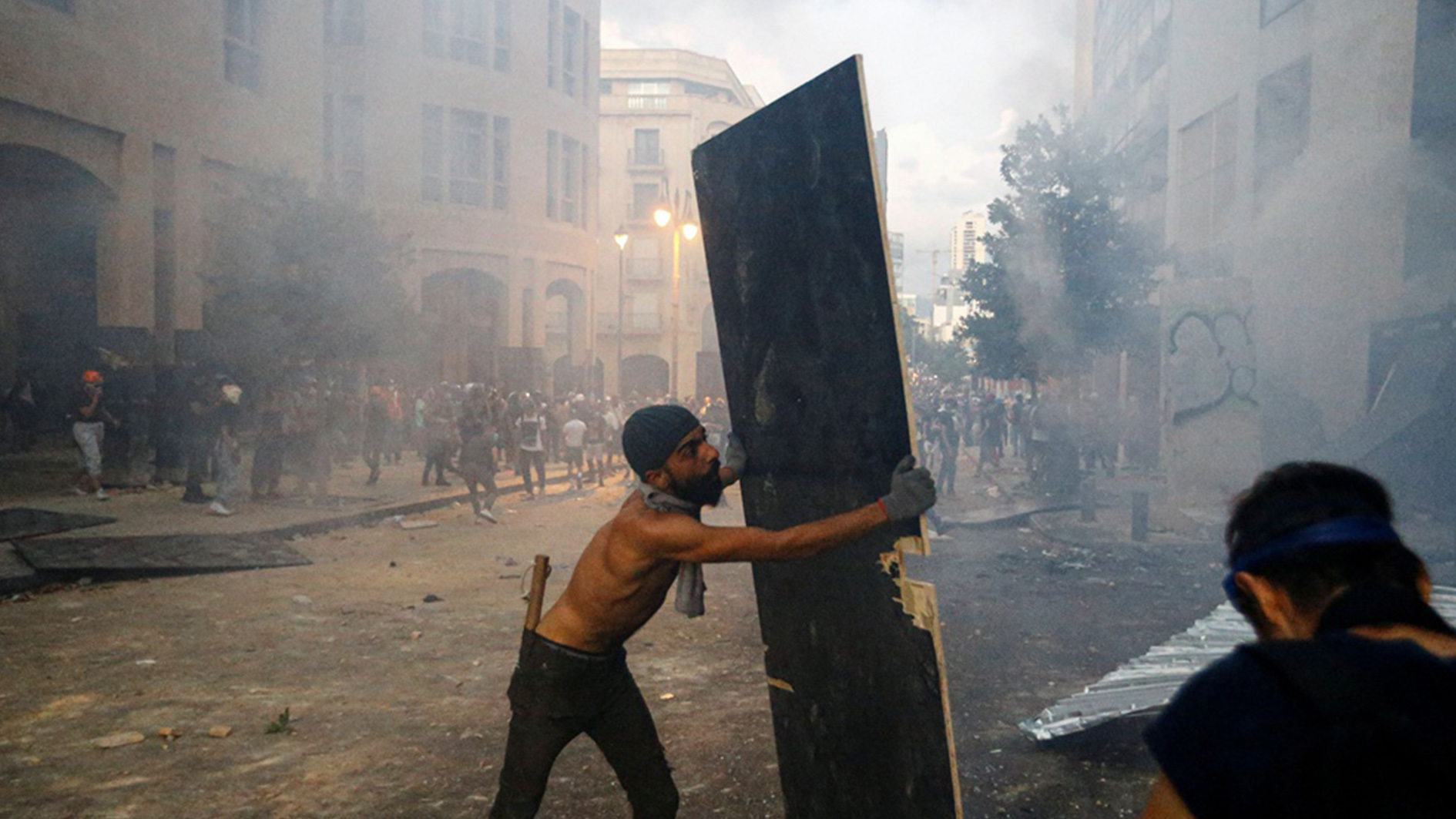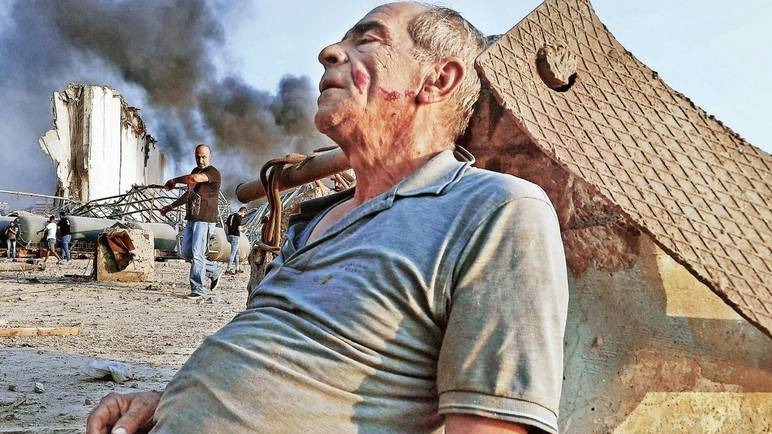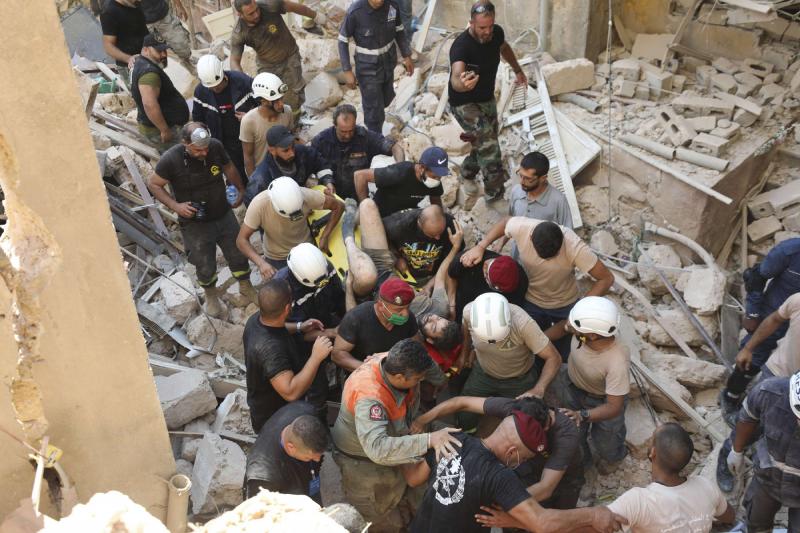02:32

Lebanese police fired tear gas to try to disperse rock-throwing protesters blocking a road near parliament in Beirut on Sunday in a second day of anti-government demonstrations triggered by last week's devastating explosion at Beirut port.
Fire broke out at an entrance to Parliament Square as demonstrators tried to break into a cordoned-off area, local TV footage showed. Protesters also broke into the Housing and Transport Ministry offices.
Lebanese Justice Minister Marie Claude Najm said in a statement on Monday she had presented her resignation from the government, citing the catastrophic explosion at the port of Beirut. Two government ministers also resigned amid the political fallout of the blast and months of economic crisis, saying the government had failed to reform.
01:04

Anger boiled over into violent scenes in central Beirut. Those protests were the biggest since October when thousands of people took to the streets to demand an end to corruption, bad governance and mismanagement.
About 10,000 people gathered at Martyrs' Square, which was transformed into a battle zone in the evening between police and protesters who tried to break down a barrier along a road leading to parliament. Some demonstrators stormed government ministries and the Association of Lebanese Banks.
One policeman was killed and the Red Cross said more than 170 people were injured in clashes.
Tuesday's explosion of more than 2,000 tonnes of ammonium nitrate killed 158 people and injured more than 6,000, compounding months of political and economic collapse and prompting furious calls for the government to quit. Riot police wearing body armor and carrying batons clashed with demonstrators as thousands converged on Parliament Square and nearby Martyrs' Square.

A wounded man sits on the ground waiting for aid at Beirut's port following the massive explosion. /AFP
A wounded man sits on the ground waiting for aid at Beirut's port following the massive explosion. /AFP
"We gave these leaders so many chances to help us and they always failed. We want them all out, especially Hezbollah, because it's a militia and just intimidates people with its weapons," said an unemployed demonstrator, said, referring to the country's most influential Iran-backed armed grouping that has ministers in the government.
The country's top Christian Maronite cleric, Patriarch Bechara Boutros al-Rai, said the cabinet should resign as it cannot "change the way it governs."
"The resignation of an MP or a minister is not enough; the whole government should resign as it is unable to help the country recover," he said in his Sunday sermon.
Lebanon's environment minister resigned on Sunday, saying the government had lost a number of opportunities to reform, a statement said.
Damianos Kattar's departure follows the resignation of Information Minister Manal Abdel Samad earlier on Sunday.

A survivor is taken out of the rubble after the massive explosion in Beirut, August 5, 2020. /AFP
A survivor is taken out of the rubble after the massive explosion in Beirut, August 5, 2020. /AFP
Amid Covid-19 pandemic, Lebanon's Health Minister said the financially troubled country was sliding toward a critical stage with a new surge in infections after lockdown restrictions were lifted and the airport reopened, though the situation is under control so far.
The recently recorded double and triple digits of new infections were coupled with an increase in untraceable cases, raising concerns that a dangerous spread in the community could follow in the country. As of August 10, the country has recorded more than 6,517 infections and 78 deaths,
Lebanon's crippling economic and financial crisis has proven more difficult to manage. In late April, the authorities began gradually easing weeks-long restrictions that threw tens of thousands out of work; Lebanon's only airport reopened on July 1.
The country's early lockdown and strict measures to contain the virus were praised for slowing down the initial spread of the pandemic. Authorities have also aggressively tested, carried out random tests, and swiftly isolated infected areas. However, the rebuilding needs of Lebanon are immense in regard to the chaotic status in so many aspects of the nation. So is the question of how to ensure the millions of dollars promised in international aid is not diverted in a country notorious for missing money, invisible infrastructure projects and its refusal to open the books.
And the port - the epicenter of the explosion that shattered Beirut, the center of Lebanon's import-based economy, and a source of graft so lucrative that Lebanon's political factions were willing to divide its control so everyone could get a piece - sits at the heart of the fears.
(With input from agencies)